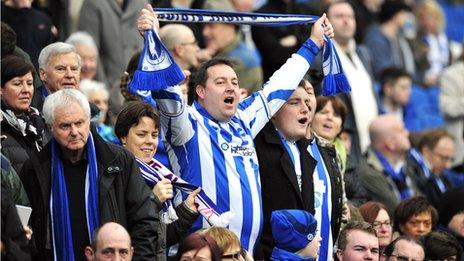Homophobia in football: How LGBT fans' groups are changing opinions on terraces
- Published
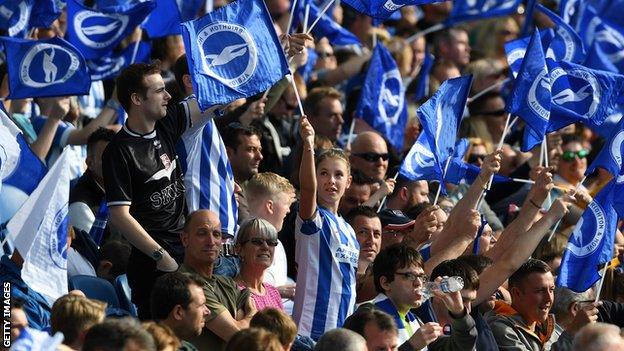
Brighton and Hove's gay population - estimated at 4.8% by the Office for National Statistics - has made the club's fans a target for homophobic abuse
WARNING: This content contains terms some readers may find offensive.
It starts with "we can see you holding hands" or "does your boyfriend know you're here?"
From there it can get more graphic or dark.
Those are two of the homophobic taunts Brighton fans reported in a dossier delivered to the Football Association in 2013, documenting abuse from rival supporters in the Championship.
"We had been complaining on a weekly basis and nobody did anything," says Liz Costa from the Brighton and Hove Albion Supporters Club.
"So we catalogued everything we had heard for a whole year. When you put it all down on paper, people's eyes started popping out of their head."
Brighton fans frequently face homophobic abuse - first published April 2013
Another chant included in the 2013 dossier, external was: "You're from a town full of gays and we hope you all die of Aids." Abuse at one ground was so bad that BBC Sussex had to turn off a crowd microphone and two fans were attacked outside another.
Costa adds: "We have been fighting it for more than 20 years. Some stewards over the years have thought it was funny, even some of the police. People said we would never get anywhere, that is was just banter.
"I'm sorry, I don't class it as that.
"If you were talking about black people rather than gay they would be whipped out of the stadium before their feet touched the floor."
Brighton is a city well known for having a substantial lesbian, gay, bisexual and transgender (LGBT) community. The Seagulls are the most prominent target of such abuse - but they are not the first or only club to suffer.
Musician Sir Elton John's position as chairman and then honorary life president means Watford fans have heard similar.
The fact Norwich have been represented by comedian and actor Stephen Fry in the boardroom and Justin Fashanu - Britain's first openly gay footballer - on the pitch trips a lonely cell in some supporters' minds.
As Brighton prepare for a first top-flight campaign in 34 years, the Premier League has already acted.
It has met Costa and Sussex police's hate crimes team, briefed other clubs about how to identify homophobic chanting and produced a poster to be displayed around stadiums.
PC Darren Balkham, force football officer for Sussex and Surrey, has passed on his experience of helping police Brighton games to various Premier League clubs, including Saturday's opponents Leicester, keeps the National Football Policing Unit updated and interacts with concerned fans via his Twitter account., external
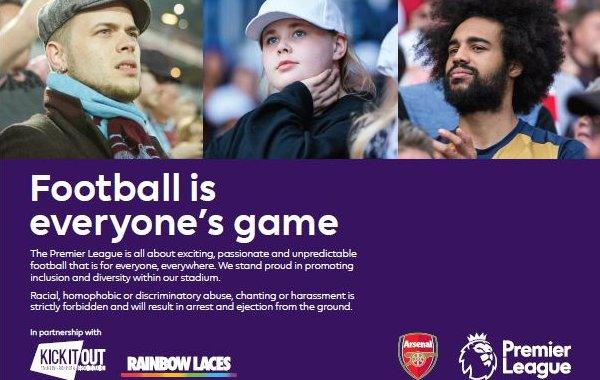
A section of the Premier League's poster that will be displayed at grounds around the division
But it is no longer just authorities that stand against the abuse.
Two months before Brighton fans published their dossier, a group of Arsenal supporters founded the Gay Gooners. It was the first LGBT fans' group in English football.
The Proud Canaries, Canal Street Blues and Proud Lilywhites soon followed at Norwich, Manchester City and Tottenham respectively - and now there are more than 30 groups across the 92 Football League clubs, with Leeds, external and QPR, external among the most recently established.
They are active, visible opposition to a terrace culture that has ranged from unwelcoming to outright hostile to unseen thousands in their midst.
"There have always been lots of gay/trans/lesbian people following football, but you wouldn't have known about it," says Gay Gooners chairman Dave Raval.
"And they wouldn't have known about each other."
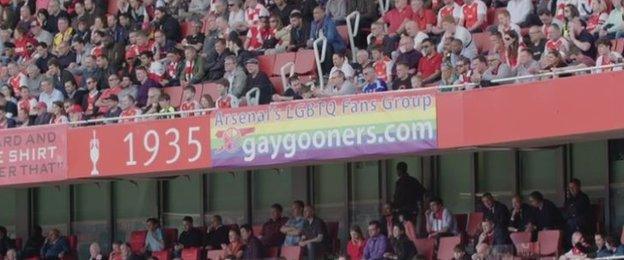
The Gay Gooners banner, which is prominent at the Emirates, was unveiled by club legend Pat Rice
As well as a pitch appearance, an endorsement from comedian Matt Lucas, the Gay Gooners publicise their existence with a rainbow banner hung from the stands at Emirates Stadium.
The flag draws in members for many reasons. When asked what motivated them to sign up, one recent recruit simply wrote: "I live in a country where they execute gay people, I support Arsenal and this is important."
Raval explains: "That flag sends a massive message to home fans, away fans - even away players. It goes out around the world.
"You can't get to a point of being normal as a gay football fan if you are not visible. Ultimately, we want people to get bored of us."
Arsenal fans in the past have sent a very different message to the global gay community.
Following Ashley Cole's defection to Chelsea in 2006, some brandished fake bank notes with Queen Elizabeth II's face replaced by their former player's. In case that was too subtle, they claimed Cole had "prostituted" himself in a literal sense to his new Stamford Bridge paymasters.
"That was an uncomfortable time to be an LGBT person following the club," says Raval.
"But the club have become more proactive in stamping out abuse. When we played Brighton away in the FA Cup in 2013 - just before Gay Gooners was founded - there was continual and widespread mild homophobic chanting by Arsenal fans. It was pretty horrible.
"Two years later, we were drawn against Brighton again. The club issued anti-discrimination warnings in the match programme and with tickets. There was a marked improvement.
"And the 2016-17 season was the first when I haven't heard those chants away at Chelsea.
"We are treading the same path of anti-racism campaigners maybe 20 or 30 years ago. We are getting there a bit faster, but there is still a way to go."
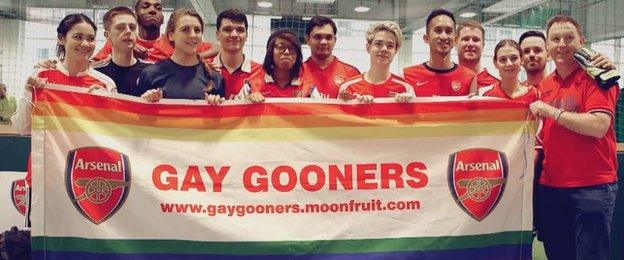
Gay Gooners is a founder member of the Pride in Football (PIF) alliance which brings together LGBT fans' groups
Across north London, divided by football but united in a cause, Chris Paouros is part of Tottenham's Proud Lilywhites.
She was at Old Trafford in April 2001 to see Sol Campbell limp off in the FA Cup semi-final against Arsenal. , external
Three months later he signed for the Gunners, sparking abuse that managed to simultaneously stigmatise race, sexuality and mental health, external in a couple of lines.
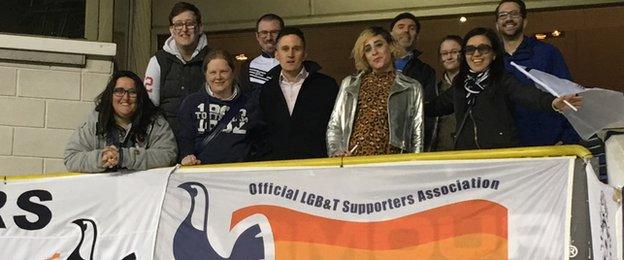
Chris Paouros, bottom row far left, went to her first Spurs game in 1980, aged seven
"I think a lot of the time it is not deliberately mendacious, it is just people thinking, 'what can we pick on'," she said.
"Sometimes you point out the specifics of it to people and they don't realise what they are saying. They are shocked. They have heard stuff and joined in."
The Proud Lilywhites - whose rainbow banner was prominent at White Hart Lane - have taken things a step further, shaping the mindset of employees as well as fellow fans.
They help run workshops with club staff - from catering, ticketing, marketing and beyond - on how they can continue to promote diversity and inclusion.
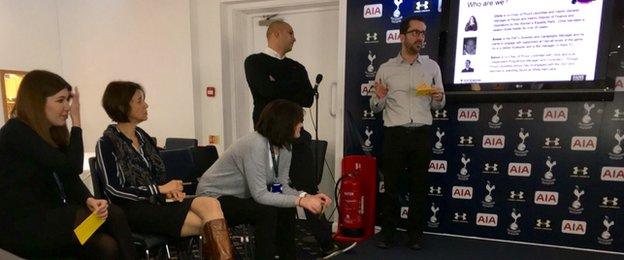
Proud Lilywhites co-chair Simon Gray (standing right) and Football Supporters' Federation's Anwar Uddin (standing left) deliver a presentation to Spurs staff
"I was determined that there was going to be campaigning and educational aspects to the Proud Lilywhites," adds Paouros. "We want to put ourselves out of business.
"Any good organisation knows it needs to be diverse and inclusive as a service provider and employer. Football clubs are no different.
"The club's head of customer engagement was at a workshop and summed it up. He said: 'It is just human, you don't want anyone to feel unwelcome at football.' That is exactly the ethos."
Only five Premier League clubs lack a recognised LGBT fans group - Manchester United, Stoke, Newcastle, Bournemouth and, lastly, Brighton themselves.
As long-standing targets for the loudest and most virulent abuse, it has been suggested a LGBT Brighton group may only provide a focal point for it to continue.
Balkham, who has worked in the city for 25 years and attended more than 650 Brighton games, theorises that LGBT fans at the club may feel they already have a voice and identity.
"It does surprise me though to be honest," he added. "I think it will come."
For now chants of "you're too ugly to be gay" or ironic applause tends to be the response. They may not have to bother for much longer.
Football's attitudes to sexuality are coming under increasing scrutiny from inside and outside the game.
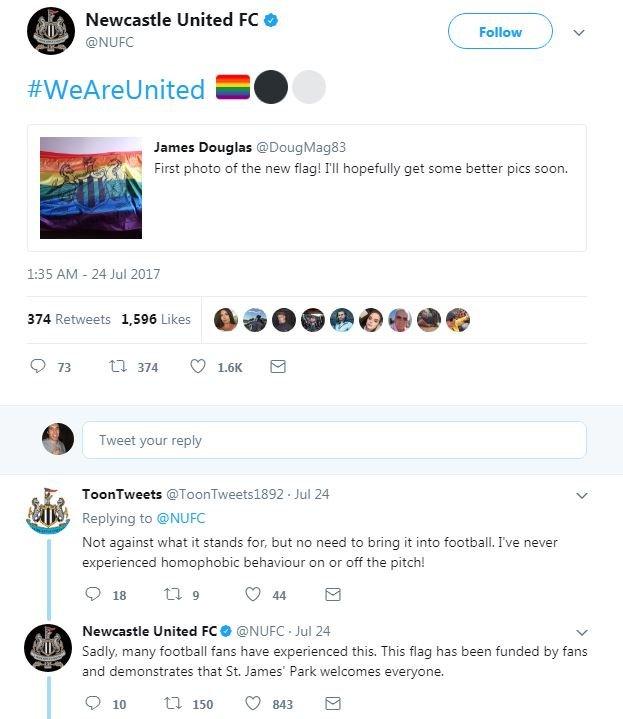
The debate over clubs' drive for inclusivity has been played out over social media
As well as prominent campaigns from Stonewall and the Football Association, there have been a slew of books, such as Ross Raisin's A Natural,, external documentaries, like Forbidden Games, external - which examines Fashanu's life - and films, like The Pass,, external questioning why some parts of football struggle to accept gay people.
According to a BBC Radio 5 live survey, 8% of fans still say they would stop supporting their team if one of their players came out. Others are repulsed by their club's badge if it comes on a rainbow backdrop.
All of which is within their rights, but thanks to the work of Raval, Paouros, Costa and many others, homophobic abuse no longer is.
"It has been a slow, slow process. And I'm getting too old to fight now," says Costa, 73.
"People come up to me and say: 'Did you hear so and so? Did you report it?' I say: 'Did you?'
"Go and report it to the nearest steward or police officer. We've done the hard work to make it easier for you."
It's a choice that, unfortunately but inevitably, many fans in the Premier League will have to make for themselves. For this season at least.
- Published4 August 2017
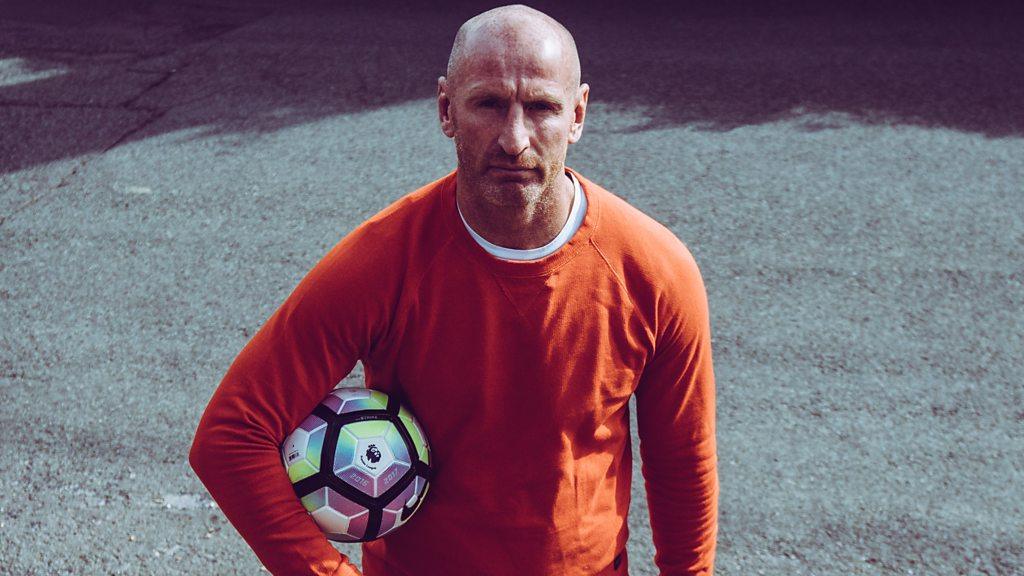
- Published10 August 2017
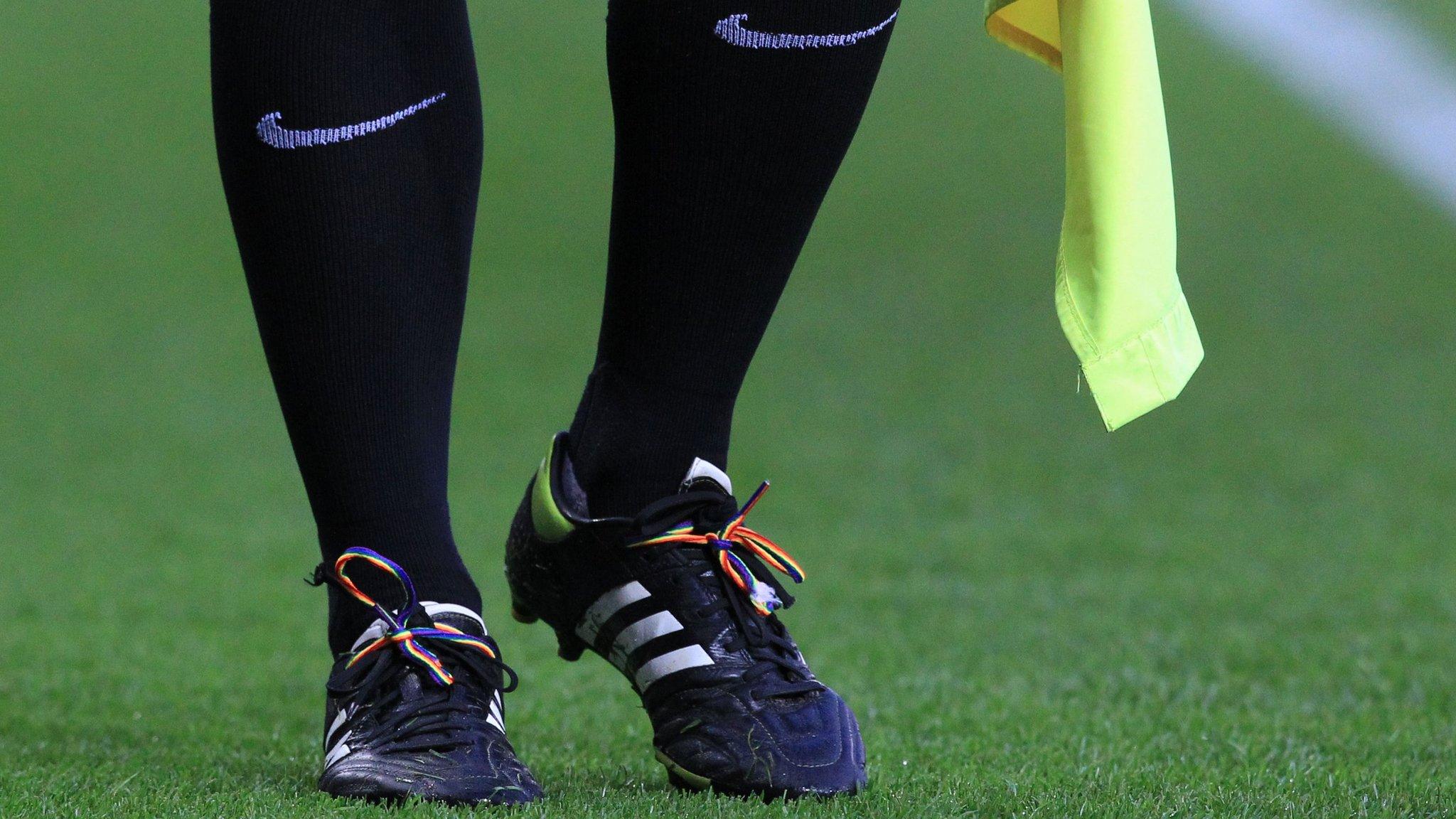
- Published12 February 2017
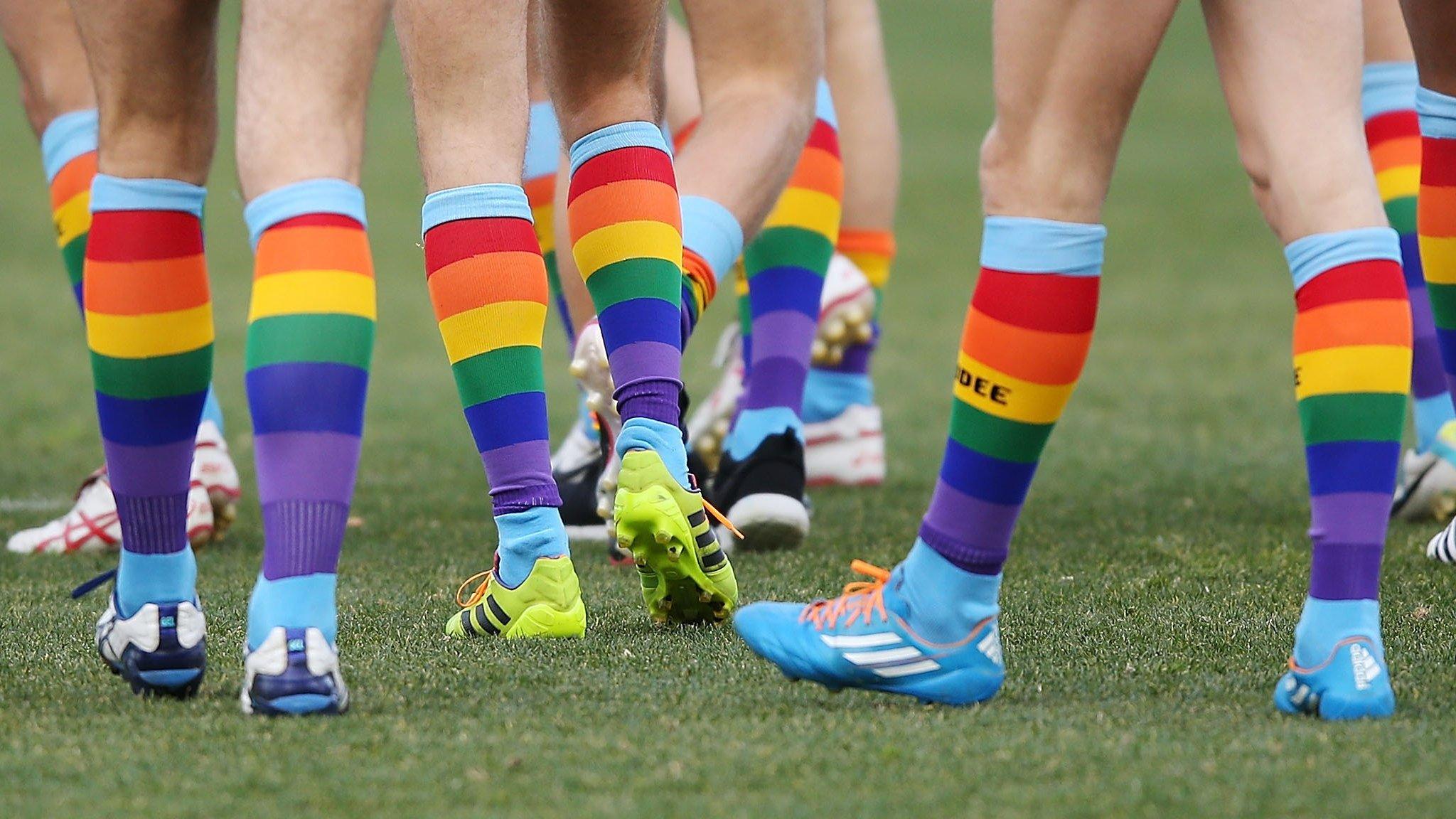
- Published2 April 2013
